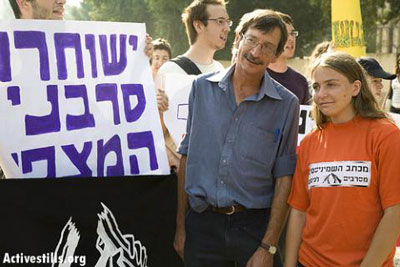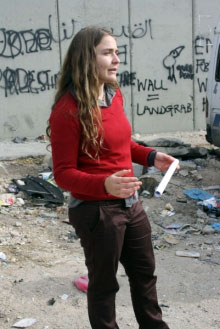A letter from Kate Taber serving in Israel/Palestine
March, 2017
Write to Kate Taber
Individuals: Give online to E200516 for Kate Taber’s sending and support
Congregations: Give to D507580 for Kate Taber’s sending and support
Churches are asked to send donations through your congregation’s normal receiving site (this is usually your presbytery).
Dear friends and family,
Greetings from Jerusalem in the springtime!
This is a momentous letter to be writing. I have the joy of introducing you to our new daughter, Rosalie, who joined our family on December 8. She is now full of smiles and laughs and is constantly squawking her many thoughts and opinions. We are thoroughly enjoying parenthood despite its uncertainties and challenges.

Introducing Rosalie, born December 8! She’s already had the privilege of meeting several visiting groups of Presbyterians and hopes to meet you too!
Yet I am also sad to be writing this letter, as it is my last as a mission co-worker. My term comes to an end April 30, and Nathan and I both feel ready to return to the States, to be closer to family and engage in ministry and conflict resolution there. It has been my privilege to serve the Presbyterian Church (U.S.A.) through maintaining and developing relationships with mission partners and allies while connecting them with and interpreting their context to Presbyterians. I pray that my work has contributed to a deepening of Presbyterians’ engagement with Israel-Palestine and our local partners while also fostering an ever more informed and faithful denominational voice on this conflict.
With this last letter, I decided one introduction is long past due. I have loved working these past three years with Sahar Vardi, a young Jewish Israeli woman running the Israel program of the American Friends Service Committee. The program focuses on raising awareness of and resisting the militarization of Israeli society. Whenever I make recommendations to visiting groups about individuals to meet, Sahar is always at the top of the list. It’s fascinating hearing about the program’s efforts, like supporting Israeli military draft refusers and raising awareness of the true costs and violations of the Israeli military industry. Yet what always makes the biggest impression on her listeners is when Sahar tells her own story.
Sahar was raised in secular Jewish west Jerusalem, segregated from both Orthodox Jews and Palestinians. When her father began volunteering during the second Intifada with an Israeli organization that worked to support Palestinian communities (Ta’ayush), she joined him. She was 12 years old. She says this is how she began to understand how the Occupation affects Palestinians’ daily lives. She tells the story of a village outside Bethlehem called An Nuaman. The land the village sits on was annexed by Israel in 1967 as part of the Jerusalem municipality, but despite having always lived there, the villagers were never given Jerusalem residency. They are considered West Bank residents and therefore living illegally on Jerusalem land. They are subject to being cut off from the electricity grid, having their water shut off, and receiving demolition orders on their homes. A checkpoint sits on the only road leading into the village, and the soldiers there have a list of every person and object allowed in and out. Villagers would call members of Ta’ayush when they encountered problems at the checkpoint.
One night, Sahar’s father received a phone call from a farmer from An Nuaman. “They won’t let my horse in,” he said. Sahar’s father learned that this man’s horse had gotten sick, and he had taken it from his home in the village to the veterinarian in Bethlehem. When he returned with the horse, the soldier at the checkpoint consulted his list, and not seeing the horse on it, he told the farmer the horse wasn’t allowed in. Sahar’s father made some phone calls and eventually someone reached the soldier’s commander, who gave him permission to let the horse in. When Sahar tells this story, she says it’s the perfect example of the evil of the Occupation. I was surprised at this statement when I first heard her say it, assuming a better example would surely include blatant racism or physical violence. Sahar says this story portrays how the Occupation functions when it’s at its very best, when everyone is following the rules. And yet even at its best, the Occupation has a chokehold on daily life, violating the human rights of freedom to move, to work, to have family life, to access education and healthcare.
As a result of this exposure to the Occupation, Sahar made the decision to refuse the military draft. All Jewish Israelis are drafted into the military at 18, men for three years and women for two. She spent three stints in prison as a punishment for her conscientious objection. Now she supports other young adults attempting to refuse the draft.
When Sahar speaks to my groups, she not only shares her personal story but also educates about the depth and breadth of militarism in Israeli society, how it shapes everything from the educational system, to advertising, to the job market. She describes a common bulletin board in kindergartens that uses word bubbles and yarn. In the center of the board is a bubble asking, “Who’s trying to kill us?” Yarn connects to other bubbles with answers like, “Hitler,” “Pharaoh,” and “the Arabs.” Sahar says this narrative that someone is always trying to kill the Jews erases the significance of who the enemy is and allows Israelis not to ask why. Instead, the enemy is just fulfilling a role that must be filled, has always been filled, and will always be filled no matter what they do. It excuses Israelis from any responsibility in just peacemaking.
Sahar recently spoke to the international conference in Jerusalem hosted by Sabeel, a Palestinian liberation theology center. Sahar is currently studying education at Hebrew University and spending time as a teaching assistant in classrooms. She says recently she was in a 9th grade social studies classroom when the teacher was explaining Israel’s political parties. As part of the conversation the teacher asked the students to go around the room, say whether they identified as being left or right wing, and why. Sahar said she wasn’t surprised when all 19 teenagers said they were right wing. However, their reason was chilling. Seventeen out of the 19 said they were right wing because they “hated Arabs.” As this rhetoric and the violence it leads to become more mainstream in Israel, Sahar is ever more committed to her work with the American Friends Service Committee. I hope the PC(U.S.A.) will continue to learn from her.
Words cannot express my gratitude for the ways you’ve supported me and this ministry, through emails, care packages, invitations, gifts, prayers, financial offerings, fellowship, and more. I pray that you continue to support this ministry with the next person to fill the position because I believe this work is vital to the faithful witness of the Presbyterian Church in the Holy Land. You will all continue to be in my prayers and I hope our paths continue to cross.
With gratitude,
Kate
![]() You may freely reuse and distribute this article in its entirety for non-commercial purposes in any medium. Please include author attribution, photography credits, and a link to the original article. This work is licensed under a Creative Commons Attribution-NonCommercial-NoDeratives 4.0 International License.
You may freely reuse and distribute this article in its entirety for non-commercial purposes in any medium. Please include author attribution, photography credits, and a link to the original article. This work is licensed under a Creative Commons Attribution-NonCommercial-NoDeratives 4.0 International License.

